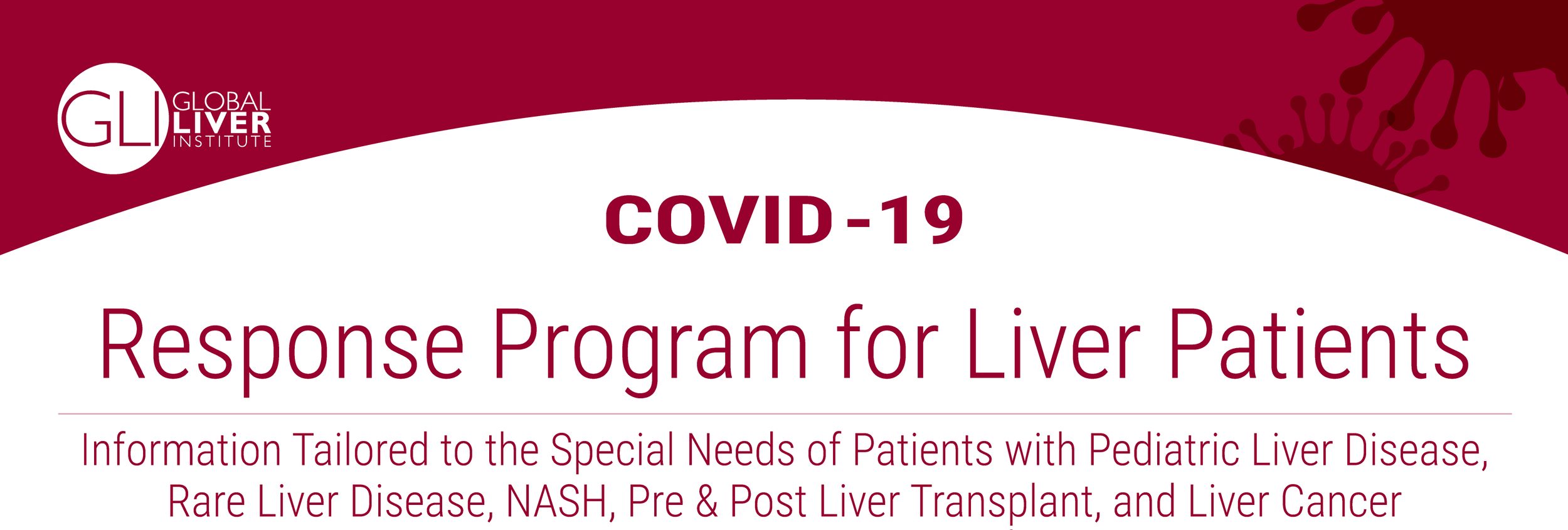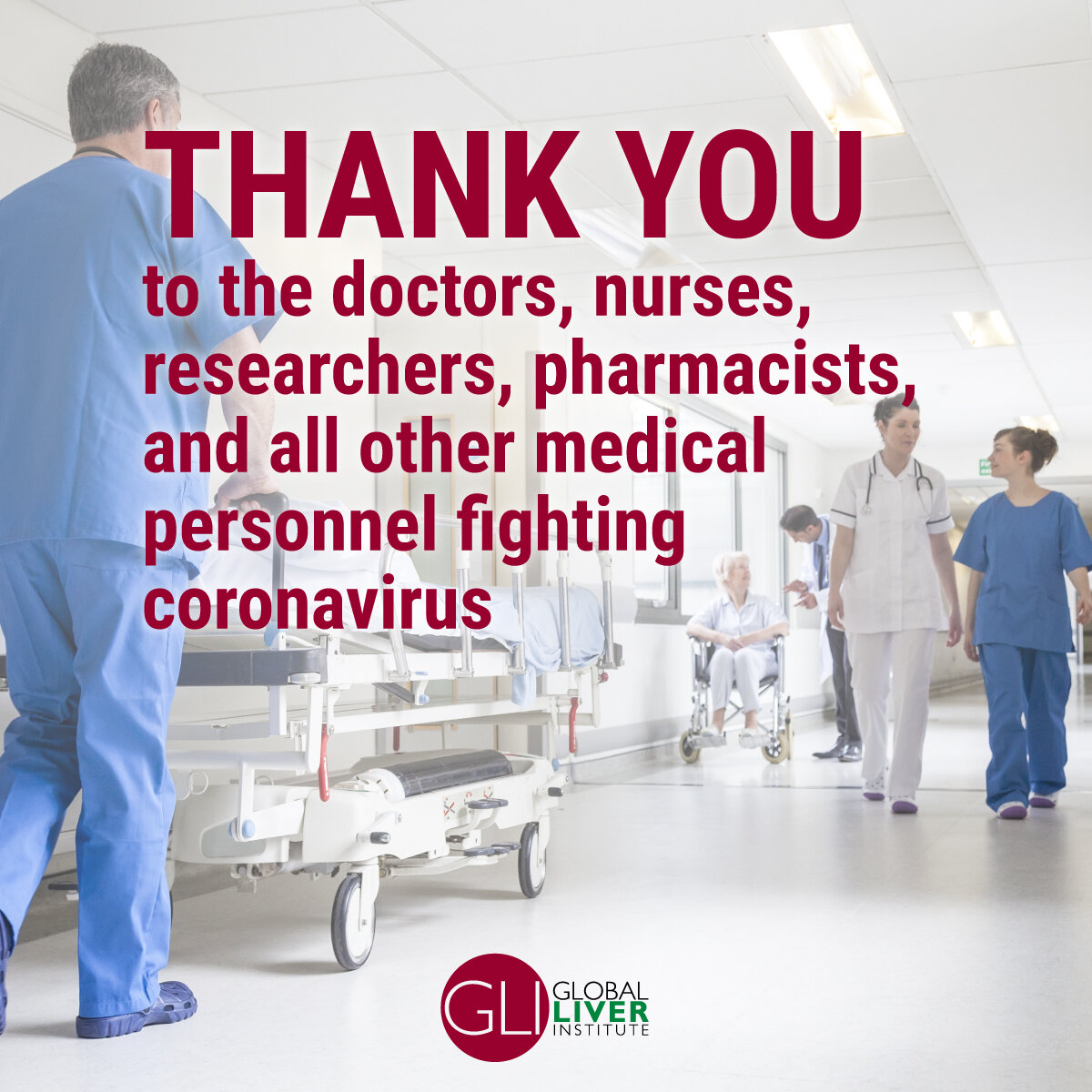

We recently recognized National Doctor’s Day in the US and joined people from around the world to applaud and celebrate all medical professionals working in the trenches and on the frontlines of care, fighting the coronavirus pandemic without rest or pause. Tens of thousands of retired physicians, nurses, physician assistants, and nurse practitioners have volunteered to come back into service, joining old and new colleagues at overwhelmed hospitals, putting themselves at high risk. No one should have to beg for personal protective equipment (PPE). Many have been infected. Several have died. As patients, as their families and neighbors we are forever grateful.
We honor all those keeping open essential services and visits for gastroenterology, hepatology, and cancer patients who now can continue to receive both COVID-19 and non-covid care. We especially love the can-do attitude that GI/hepatologists have brought to this fight. During the American Association for the Study of Liver Diseases (AASLD) webinar on its COVID-19 Clinical Insights, they assured us “We’ve Got This!” American College of Gastroenterology (ACG) President, Mark Pochapin, MD issued an inspirational call to action video on Twitter using the hashtag #me2we
Lastly, we commend GI/hepatologists in the EU and US for collaborating to find the answers to the questions we have been asking about how liver patients fare if infected with COVID-19. In the US the Secure Cirrhosis Registry was established and the EU Registry endorsed by EASL is COVID-HEP)
Newly issued clinical guidance
UK Oncologists issued a tiered set of treatment guidelines for cancer patients during this time on March 23, 2020.
EASL and the European Society of Clinical Microbiology and Infectious Diseases (ESCMID) issued a Position Paper, on April 2, 2020, providing recommendations for clinicians caring for patients with liver diseases during the current pandemic. This paper includes a useful flow chart on care that should continue and care that can be postponed segmented for patients with chronic liver disease, decompensated disease, HCC, and post-transplant. The paper also underscores the messages about the importance of social distancing, telehealth, non-covid outpatient facility access, and prioritization of liver patients for early inpatient admission as high-risk if infected with COVID-19.
European guidance on clinical trials
The European Commission, the European Medicines Agency (EMA) and national Head of Medicines Agencies (HMA) have published new recommendations for sponsors on how to manage the conduct of clinical trials in the context of the coronavirus disease (COVID-19) pandemic. The impact of the pandemic on European health systems and more broadly on society, will make it necessary for sponsors to adjust how they manage clinical trials and the people who participate in these trials.
Data on high risk COVID-19 patients
CDC data updated on March 31, 2020 reviewed 7,160 cases and noted that of people requiring admission to intensive care units (ICUs), 78% had at least one underlying health condition. The most prevalent condition tracked was type 2 diabetes at 10.9%, This may have implications for patients with NASH which is often concurrent with diabetes.
Global leadership, collaboration, and connectivity matter even more in times of crisis. Our gastroenterologists, hepatologists, oncologists and everyone in the medical community continue to make us proud.
Select Q & A from our COVID-19 personalized response account (covid19@globalliver.org) – edited for brevity and to preserve privacy
My 4 year old son had a liver transplant at 18 months old, what would happen if he caught COVID-19?
The fact that your son is more than a year post-transplant and hopefully stable is a good thing. Immunosuppression or being immunocompromised does not mean that your child’s immune system will not wage a defense against disease, only that it is weakened in specific ways. The experience with the novel coronavirus that we have so far is inconclusive (so few cases to learn from) but young children seem to be less affected. The Italian paper, “Coronavirus Pandemic and Immunosuppressed Liver Patients” written by Lorenzo D’Antiga, (Paediatric Hepatology, Gastroenterology and Transplantation Hospital Papa Giovanni XXIII, Bergamo Italy) said that our suppressed immune system may make it LESS likely for our immune systems to mount the type of response that is causing the harmful lung damage (note several of the drugs in testing are anti-inflammatories and have some of the same effects as our transplant drugs). It may be that for many of us we are not significantly more likely to catch something but it stays with us longer.Bottom line – keep strict social distancing rules for your family (only virtual play dates), wash hands frequently, wipe surfaces and packages (as I know you must do already), and, if you detect any fever (over 100.4 F), dry cough, shortness of breath notify both transplant and primary care. We are working hard to ensure that the system stays prepared to treat liver patients during this challenge and AASLD, the hepatology medical society, sent a letter from its board requesting priority in testing for liver patients.
I have PSC and work in a hospital environment. Currently we’re on a lock-down. Having PSC and being around people who potentially have COVID-19 is nerve-wracking. Are there any recommendations you have in regards to limiting exposure for people who are immunocompromised and are mandated to work in environments with increased exposure?
I would advise alerting your supervisor of your immunosuppressed status. They should be able to do that only by sharing your condition with those who need to know. You should be prioritized for PPE and may be eligible for reassignment. Also, they may have or can learn protocols for reducing the number of times needed to enter a patient room, whether through remote monitoring or bundling care needs. Make regular temperature checks part of your routine.
Should I (non-healthcare worker) wear a mask when I go out? [paper or cloth, not surgical masks or N95 respirators]
The CDC is currently debating this issue. Many Asian countries scaled up production so that everyone, not just healthcare workers can wear masks. People who are sick or taking care of someone sick are advised to wear masks.The WHO guidelines and videos on masks are very useful. However, it does NOT recommended to wear a mask for healthy members of the general population.
In China some explain it takes away stigma for masks to be widely worn. In the US there are limited supplies of masks as of this writing, so if our healthcare workers, caregivers, and other 1st responders have access to sufficient masks, a mask may offer some protection, even if only psychological.
For more information on mask use and reuse for healthcare workers The ECDC published a paper suggesting the sterilization of masks in case of shortage.
If we have the option of having a home blood draw or going to an outpatient facility which is best?
I do not know if either definitively presents less risk than the other, but in the home health situation there is the opportunity to watch the handwashing and hygiene of the nurse/technician, define the area they work and clean it afterwards to your satisfaction. In the outpatient facility, you would need to understand their COVID-19 policies, how they sequester patients, maintain social distancing, and clean their facilities, and there are more opportunities to interact with more people. I would choose the home health blood draw.
Advances in Accessing Care
Telehealth
For the duration of the COVID-19 Public Health Emergency, Centers for Medicare and Medicaid (CMS) has waived several of the barriers to providing telehealth so many more health systems are providing them and many insurers have partnered with several telehealth companies such as TelaDoc, American Well, and Doctor on Demand. Some of the costs of these may be waved during the pandemic.
Veterans have access to telehealth services through My HeatheVet secure messaging and the VA appointments tool. https://www.va.gov/coronavirus-veteran-frequently-asked-questions/
Healthcare workforce shortages
CMS and several European countries have also waived certain requirements to enable and encourage hospitals to hire local physicians and other providers to address potential surges. New rules allow hospitals to support physician practices by transferring critical equipment, including items used for telehealth, as well as providing meals and childcare for their healthcare workers.
Coverage
Most major private payers have waived patient cost-sharing for COVID-19 testing and treatment.
It is disappointing to see that President Trump has refused to reopen Affordable Care Act (ACA) enrollment. The health care law could provide much-needed financial security to millions of uninsured Americans who are worried about large health bills during the Covid-19 crisis.
Nearly all of the 13 states running their own ACA marketplaces, including the District of Columbia, have reopened enrollment in recent weeks — and some are reporting sharp increases.
However, President Trump did say he is considering using federal programs like Medicare and Medicaid to cover the rising ranks of the uninsured. Overall even with reopening enrollment for healthcare exchanges, a U.S. health system that is still largely based around job-based insurance is going to continue experiencing issues during this pandemic. We strongly believe that the next COVID-19 response package should address some of these healthcare cost concerns.
Prescriptions
More major private payers and pharmacies are allowing early refills and home delivery of prescriptions.
For as long as the Secretary’s designation of a public health emergency remains in effect, DEA-registered practitioners may issue prescriptions for controlled substances to patients for whom they have not conducted an in-person medical evaluation, provided certain conditions are met.
If the prescribing practitioner has previously conducted an in-person medical evaluation of the patient, the practitioner may issue a prescription for a controlled substance after having communicated with the patient via telemedicine, or any other means so long as the prescription is issued for a legitimate medical purpose and the practitioner is acting in the usual course of his/her professional practice.
What I am Doing as Transplant Patient-in Chief
After a month of intense work from home, only going outside to walk the dogs, managing stress is top of mind for me. I was very excited to connect (or disconnect) with Headspace which has unlocked a free, specially-curated “Weathering the storm” collection of meditation and mindfulness content for consumers in English, French, German, Spanish, and Portuguese. The free selection of meditation, sleep and other experiences is designed to support consumers around the world during the COVID-19 outbreak. The collection is available in the “Explore” tab starting today worldwide.
I also explored the topic on my Wednesday GLI Live Facebook event; “Coping with Coronavirus” with special guest, Sara Goldberger, MSW.
Stay safe, well, and connected.
Sincerely,

Donna R. Cryer
Founder & CEO
Liver Transplant 1994 Johns Hopkins
Featured GLI LIVE Episodes


